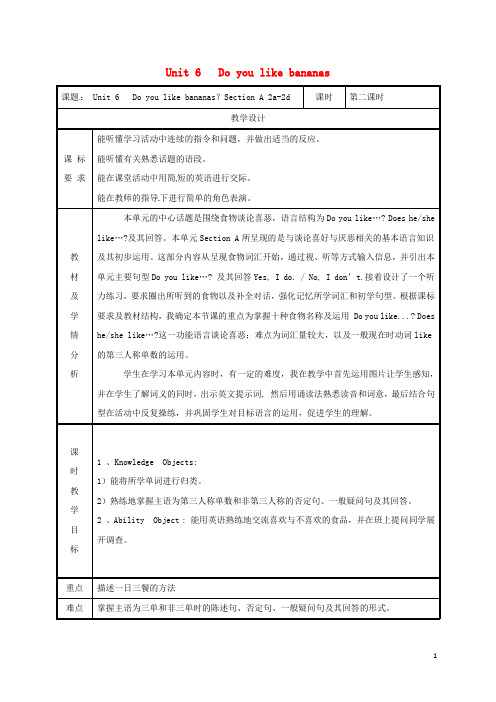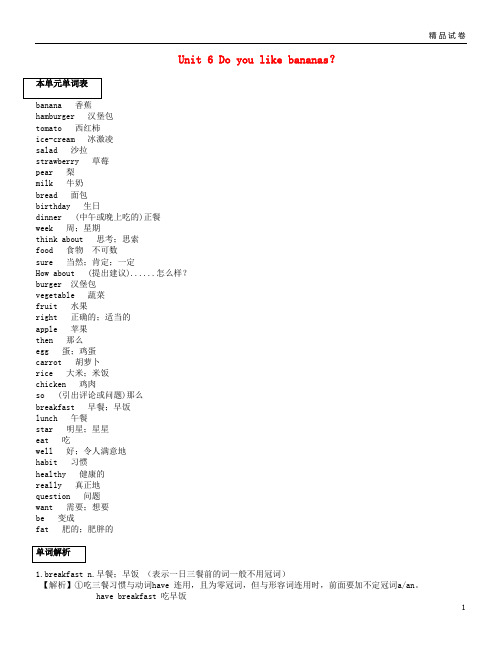湖南省益阳市七年级英语上册Unit6DoyoulikebananasSectionA(2a_2d)教案新人教目标版
- 格式:doc
- 大小:120.50 KB
- 文档页数:6



七年级英语上册Unit6Doyoulikebananas必考知识点归纳单选题1、—Are those ________?—No, they aren’t.They’ re ________.A.sheep; cowsB.sheep; cowC.sheeps; cowsD.sheeps; cow答案:A句意:——那些是绵羊吗?——不,它们不是。
它们是奶牛。
考查名词复数。
sheep绵羊,可数名词,复数形式为sheep;cow奶牛,可数名词,复数形式为cows。
空一之前有those修饰,故名词应用复数形式sheep;根据主语“They”可知,空二应用复数名词cows。
故选A。
2、—Have we got any ________?—No, we haven’t.A.apples juiceB.an apple juiceC.apples juicesD.apple juice答案:D句意:——我们有苹果汁吗?——不,我们没有。
考查名词的数。
结合题意可知“juice”果汁,为不可数名词,不能用不定冠词a/an修饰,也没有复数形式。
故排除选项B和C。
“苹果汁”的英文表达为apple juice,此时apple作定语,修饰名词。
故选D。
3、There are many kinds of ________ in the river. You can go _________ there.A.fishes; fishingB.fishes; fishC.fishs; fishingD.fish; to fish答案:A句意:河里有许多种类的鱼,你可以去那钓鱼。
考查名词的数和动词短语。
根据“ many kinds of ”可知这里表示很多种类的鱼,“fish”强调种类的时候可数,故这里用复数;根据“You can go”可知这里考查短语go fishing“去钓鱼”。
故选A。
4、Volleyball stars must eat _________ and have _________ habits.A.good; goodB.good; wellC.well; goodD.well; well句意:排球明星必须吃得好,也要有良好的习惯。

Unit 6 Do you like bananas课题: Unit 6 Do you like bananas?Section A 2a-2d 课时第二课时教学设计课标要求能听懂学习活动中连续的指令和问题,并做出适当的反应。
能听懂有关熟悉话题的语段。
能在课堂活动中用简短的英语进行交际。
能在教师的指导下进行简单的角色表演。
教材及学情分析本单元的中心话题是围绕食物谈论喜恶,语言结构为Do you like…? Does he/she like…?及其回答。
本单元Section A所呈现的是与谈论喜好与厌恶相关的基本语言知识及其初步运用。
这部分内容从呈现食物词汇开始,通过视、听等方式输入信息,并引出本单元主要句型Do you like…? 及其回答Yes, I do. / No, I don’t.接着设计了一个听力练习,要求圈出所听到的食物以及补全对话,强化记忆所学词汇和初学句型。
根据课标要求及教材结构,我确定本节课的重点为掌握十种食物名称及运用 Do you like...? Does he/she like…?这一功能语言谈论喜恶;难点为词汇量较大,以及一般现在时动词like 的第三人称单数的运用。
学生在学习本单元内容时,有一定的难度,我在教学中首先运用图片让学生感知,并在学生了解词义的同时,出示英文提示词, 然后用诵读法熟悉读音和词意,最后结合句型在活动中反复操练,并巩固学生对目标语言的运用,促进学生的理解。
课时教学目标1 、Knowledge Objects:1)能将所学单词进行归类。
2)熟练地掌握主语为第三人称单数和非第三人称的否定句、一般疑问句及其回答。
2 、Ability Object : 能用英语熟练地交流喜欢与不喜欢的食品,并在班上提问同学展开调查。
重点描述一日三餐的方法难点掌握主语为三单和非三单时的陈述句、否定句、一般疑问句及其回答的形式。
教法学法指导Guessing. 通过猜测,并大胆发言,以学习新知。


Unit 6 Do you like bananas?banana 香蕉hamburger 汉堡包tomato 西红柿ice-cream 冰激凌salad 沙拉strawberry 草莓pear 梨milk 牛奶bread 面包birthday 生日dinner (中午或晚上吃的)正餐week 周;星期think about 思考;思索food 食物不可数sure 当然;肯定;一定How about (提出建议)......怎么样?burger 汉堡包vegetable 蔬菜fruit 水果right 正确的;适当的apple 苹果then 那么egg 蛋;鸡蛋carrot 胡萝卜rice 大米;米饭chicken 鸡肉so (引出评论或问题)那么breakfast 早餐;早饭lunch 午餐star 明星;星星eat 吃well 好;令人满意地habit 习惯healthy 健康的really 真正地question 问题want 需要;想要be 变成fat 肥的;肥胖的1.breakfast n.早餐;早饭(表示一日三餐前的词一般不用冠词)【解析】①吃三餐习惯与动词have 连用,且为零冠词,但与形容词连用时,前面要加不定冠词a/an。
have breakfast 吃早饭have a good breakfast 吃一顿丰盛的早餐have a quick breakfast 早餐吃得很快②at breakfast 吃早餐时【扩展】brunch n.早午餐2. well adv.好;令人满意地【解析】常见搭配:do well in…在……做得好辨析good,fine,well,fine.① good 意为“好的,令人满意的”,常指物品的质量,人的品质等方面的好,也常与morning,evening,afternoon等词搭配表示问候。
Alice is a good girl. 爱丽丝是一个好女孩。
Unit 6 do you like bananas? Section B (1a-1e)Teaching aims:1.Master the words about vegetables and fruit.2.Talk about likes and dislikes.3.Key sentences:What do you like for breakfast/ lunch/ dinner?Do you like....? Yes, l do./ no, i don’t.Does he/ she like... ? Yes, he/ she does. No, he/ she doesn’t.4.Listen and find the key information.Teaching difficult and important points:1.Be able to talk about likes and dislikes;2.Be able to talk about eating habits by using these sentences:What do you like for breakfast?What do you like for lunch?What do you like for dinner?Teaching steps:Step 1. Lead inKnowledge ReviewDictation the words and phasesStep 2. Free talkWhat do you eat for breakfast?What do you eat for lunch?What do you eat for dinner?Which do you think is healthy food?Which do you think is unhealthy food?Step 3. PresentationTask 1. Write the number of each word next to the correct food.(work on 1a) Task 2. How many other words can you add to the lists? (work on 1b)Step 4. Group workTalk about eating habits“ what do you like for breakfast/ lunch/ dinner? ”Step 5. Listen activitiesTask 1. Listen and circle the food you hear in 1a.Task 2. Fill in the chart.Task 3. Ask and answer questions about what sally and tom like and don’t like.Step 6. PracticeDoes sally / tom like...?Yes, she / he does.No, she /he doesn’t.Step 7. Exercise一、单项选择1. Wu Ling likes pears but she ___ bananas.A. likesB. don’t likeC. doesn’t like2. —_____ your brothers like hamburgers?—Yes, ______.A. Do; they doB. Does; he does3. We don’t have ______. Let’s go and buy(买) some tomatoes and carrots.A. vegetablesB. foodC. hamburger4. Look! The chicken ______ on the table and the pears ______ in the bag.A. is; isB. are; areC. is; are5. —Let’s ______ some vegetable salad then.—Sounds good.A. likeB. haveC. find C. Are; they are二、句型转换1. He eats chicken every day. (改为一般疑问句)______ he ______ chicken every day?2. Tom has hamburgers for dinner.(改为否定句)Tom _______ _____ hamburgers for dinner.3. I have two eggs for breakfast. (划线部分提问)_____ _____ you ______ for breakfast?4. Mary likes fruit salad. (改为一般疑问句)______ Mary ______ fruit salad?5. They like bananas for dinner. (改为否定句)They _____ ____ bananas for dinner.6. —Does your sister like oranges? (作否定回答)—___, _____ _______.7. We have some fruit after dinner. (改为由let开头的祈使句)_____ ____ some fruit after dinner.8. Paul likes milk. He doesn’t like bread. (合为一句)Paul likes milk, ____ he doesn’t like bread.。
七年级上册英语Unit 6《Do you like bananas》知识点【重点词语】1. French fries 薯条2. ice cream 冰激凌3. running star 跑步明星4. lots of 许多,大量5. healthy food 健康食品6. unhealthy food 不健康食品7. make a list 列表,制表 8. eat/have breakfast 吃早餐 9. for breakfast 对于早餐来说【重难点分析】1. 可数名词和不可数名词(什么是可数名词,什么是不可数名词大家要会区分,这是学习语法的基础的基础)(1)可数名词:①定义:是可以计数的名词。
②可数名词前可以用a,an限定。
③可数名词前可以用one,two,three…限定。
④可数名词有复数形式。
(2)不可数名词:①定义:指不能计数的名词。
②不可数名词前不可以用a,an限定。
③不可数名词前不可以用one,two,three…限定。
④不可数名词没有复数形式。
2. 名词变复数的变换规则(对于变换复数的规则大家务必要掌握,这是比较重要的一个规则,如果实在不能掌握,我的个人建议是记住常见的一些名词的复数,这样也是可以应付考试的)(1)一般在名词词尾加-s.如:banana-bananas(2)以-o,-s,-sh,-ch及-x结尾的名词,在词尾加-es构成复数形式。
如:tomato-tomatoes(3)有些以-o结尾的名词仍加-s.如:photo-photos(4)以辅音字母加-y结尾的名词,把y去掉,加-ies.如:family-families(5)以-f或-fe结尾的名词,把f,fe去掉再加-ves.如:life-lives(6)有些名词以改变拼写来构成复数形式,即是不规则变化。
如:man-men (7)有些名词单、复数相同。
如:sheep-sheep3. lots of 大量的,许多的lots of在意思上与a lot of相同,都表示“大量、许多”,但lots of主要用于口语,两个都可以用来修饰可数名词和不可数名词,如:I haven't got a lot of time. 我们的时间不多了。